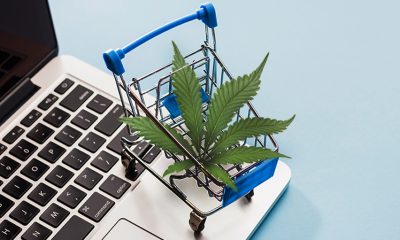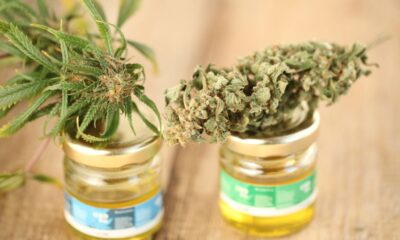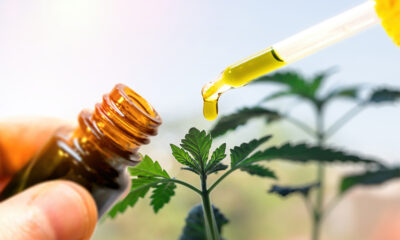CBD Products
CBD Guide: Here’s Why Reading the Label Matters

You’ve probably heard this before but reading the label before purchasing a product is a key step to buying CBD. Sure, while the substance is now on mainstream, it’s relative newness still makes it an alien to most of the modern-day consumers.
After all, not only are the terms surrounding the substance still confusing, but the laws related to buying and selling cannabidiol also remain vague and shaky. Given these conditions, it’s not surprising that interested consumers are taking it upon themselves to stay on top and be fluent on the CBD language.
If you’re one among those who are currently eyeing to make their first CBD purchases, joining the trend and becoming a good label reader is a must. Here, we have rounded up the reasons why.
Read on.
Reasons to Read CBD Labels
The “Promises” Concern
Often described to be a modern-day medicinal wonder, CBD has been linked to a broad range of medical uses, including the ability to relieve pain, control seizures, and even relieve anxiety. However, while there has been a variety of medical claims associated with the drug, its ability in treating some childhood epilepsy syndromes is the only one that has been found to suggest the strongest scientific evidence to date.
With this, it’s no wonder that many are also naming CBD to be a modern-day “snake oil,” as despite the many medical claims linked to the substance, only a few has been proven.
Because of this, consumers are left with no other choice but to do the research themselves and see whether the claims written on a CBD product are, indeed, reliable or not.
By taking note of what’s written on a product and searching whether those “promises” are, indeed, valid (by browsing through the net and consulting medical experts), one will get to determine whether the brand he is turning to is reliable and genuine.
To date, there now comes a ton of CBD companies that have been warned by the Food and Drug Administration (FDA) over their misleading claims about the power of CBD. Try to research on those brands, or better yet, try to examine the product whether it indicates it has undergone third-party lab tests. To do the latter, you can look or scan the QR code (via your phone) of the product to see if it bears a certificate of analysis (COA).
The Preference Concern
One of the disadvantages of not examining the label of CBD products is not knowing its effect on the one who will be taking it. Sure, while CBD is known for its lack of “high state” effect, some products still contain tetrahydrocannabinol (THC), which is known to be the principal psychoactive constituent of cannabis.
Given this, it’s important to know what type of CBD product one is looking for. Specifically, to date, CBD items are often distinguished into three categories: full spectrum, broad spectrum, and isolate.
Full spectrum means the product contains all the naturally available compounds found in the cannabis plant – which include other cannabinoids and terpenes, such as THC.
Meanwhile, broad spectrum contains the naturally available compounds, except THC.
And, lastly, CBD isolate refers to a product that contains the purest form of CBD, meaning no other cannabinoids and terpenes is present in it.
The Legal Concern
As mentioned earlier, some CBD products contain certain levels of THC. Generally, this is dictated by the source of the CBD oil. Specifically, there are two common sources where cannabidiol can be derived: hemp and marijuana. The difference, however, is that hemp plants have no more than 0.3 percent THC, while marijuana contains more.
To date, since cannabis remains illegal in federal level, local authorities have it upon themselves to impose their own cannabis laws. Depending on the local policies present in the state where one lives, he or she may be allowed to buy both marijuana-derived and hemp-derived CBD products or only the latter.
The Bottom Line
With the apparent boom of CBD, it’s no surprise that a broad variety of this substance is now flooding the marketplace. Purchasing from a reputable retailer online with the proper CBD merchant account and qualifications will help you steer clear of low-quality products. If you’re interested to try out any of these items, making sure that you’re on the right track is a must to keep you from possible health and legal pitfalls.
Medical Disclaimer:
The information provided in these blog posts is intended for general informational and educational purposes only. It is not a substitute for professional medical advice, diagnosis, or treatment. Always seek the advice of your physician or other qualified healthcare provider with any questions you may have regarding a medical condition. The use of any information provided in these blog posts is solely at your own risk. The authors and the website do not recommend or endorse any specific products, treatments, or procedures mentioned. Reliance on any information in these blog posts is solely at your own discretion.
Hemp
Hemp Tobacco: A Sustainable Alternative with Growing Popularity

Hemp tobacco, a relatively new and innovative concept, is gaining traction as an alternative to traditional tobacco products. With increasing concerns about the environmental and health impacts of conventional tobacco, hemp tobacco offers a promising solution that aligns with sustainability goals and appeals to a new generation of consumers. In this article, we will explore what hemp tobacco is, its benefits, and the challenges it faces as it continues to make its mark in the industry.
What is Hemp Tobacco?
Hemp tobacco is essentially a smokable product made from hemp plants, specifically the flowers, leaves, and stalks, which are process and dried to create a smokable material. Unlike traditional tobacco, which is derive from the Nicotiana tabacum plant, hemp is a variety of Cannabis sativa, a plant known for its wide range of uses, from textiles to biofuels. While hemp contains negligible amounts of THC (the psychoactive compound in marijuana), it is rich in cannabidiol (CBD), a non-intoxicating compound believed to offer various health benefits.
Hemp tobacco products mimic the appearance and feel of traditional tobacco but are made from hemp strains that have low levels of THC, making them legal in many regions. The cultivation process of hemp tobacco is generally more eco-friendly, as hemp is known for its ability to grow quickly and without the heavy use of pesticides or synthetic fertilizers. As such, tobacco is gaining recognition as a sustainable and healthier alternative to its nicotine-based counterpart.
The Benefits of Hemp Tobacco
- Healthier Option for Smokers
One of the most compelling reasons for the rise of tobacco is the growing concern over the harmful effects of smoking traditional tobacco. Tobacco smoke contains thousands of harmful chemicals, including tar and carcinogens, which have been linked to a variety of diseases, including lung cancer, heart disease, and respiratory conditions. Hemp, on the other hand, is often marketed as a healthier alternative due to its lack of nicotine and lower levels of harmful chemicals.
While hemp tobacco is not entirely free of risks, it does not carry the same addictive qualities as nicotine, and many users report fewer negative side effects, such as coughing and shortness of breath, compared to traditional tobacco smoking. Moreover, CBD, the primary cannabinoid in hemp, is believe to have anti-inflammatory and antioxidant properties, which could potentially mitigate some of the negative effects associated with smoking.
- Sustainability and Environmental Benefits
The environmental footprint of tobacco farming is another critical factor contributing to the rise of hemp tobacco. Traditional tobacco farming is notorious for its heavy use of pesticides, fertilizers, and water resources. In contrast, hemp is a highly resilient plant that requires minimal pesticides and fertilizers. It is also less water-intensive, making it a more sustainable crop, especially in regions affected by water scarcity.
Hemp plants are also excellent at improving soil health by reducing soil erosion and promoting biodiversity. Their deep roots help maintain soil integrity, while hemp can be rotate with other crops to restore nutrients to the soil. This makes tobacco a far more eco-friendly choice compared to conventional tobacco.
- The Appeal of CBD
CBD is one of the most well-know compounds derive from hemp, and its potential health benefits have fuel a rapidly growing industry. As a non-psychoactive compound, CBD does not produce the “high” associated with marijuana use. Instead, it is tout for its therapeutic properties, including stress relief, pain management, and potential benefits for anxiety and depression.
Many hemp tobacco products are infuse with CBD, which enhances the overall experience and may offer additional wellness benefits. For individuals seeking relaxation or stress reduction without the effects of nicotine. Hemp tobacco with CBD could provide a more appealing option.
- Legal and Regulatory Considerations
One of the primary advantages of tobacco is its legal status. In many countries, hemp is legal due to its low THC content. As long as the hemp use in the production of tobacco products complies with local regulations. It can be sell in the same markets where marijuana is still illegal. This makes hemp tobacco a more accessible and versatile product in comparison to cannabis-based alternatives. Which can face more stringent legal restrictions.
Challenges Faced by Hemp Tobacco
Despite its growing popularity, tobacco faces several challenges on its path to mainstream acceptance. These challenges include regulatory hurdles, public perception, and the complexities of consumer education.
- Regulatory Uncertainty
The legal landscape surrounding hemp and cannabis products can be complex and inconsistent across regions. While hemp with less than 0.3% THC is legal in many places, the rules governing. Its cultivation, processing, and sale can vary significantly. This uncertainty can make it difficult for hemp producers to navigate. The regulatory environment and may create barriers to entry for new businesses.
Additionally, some countries still have restrictions on the sale of smokable hemp products, even though hemp-derived CBD is often allow. As laws continue to evolve, producers of hemp must stay informed and adapt to changes in the regulatory framework.
- Stigma and Misconceptions
Even though tobacco is deriv from the same plant as marijuana, it is often view with skepticism or confusion by the general public. Some consumers still associate hemp products with the “stoner” culture, despite the fact that tobacco contains little to no THC. As such, tobacco producers must work hard to educate consumers about the differences between hemp and marijuana and emphasize the health and environmental benefits of their products.
- Market Competition
Hemp tobacco is competing with both traditional tobacco products and the growing cannabis market. While it offers a healthier, more sustainable option, it may struggle to break through in a market. That is already saturate with a variety of smoking products. Additionally, consumer habits around tobacco and cannabis use are deeply ingraine. Making it challenging for hemp tobacco to convince traditional smokers to switch to a new product.
Conclusion
Hemp represents a promising and innovative alternative to traditional tobacco, offering several potential benefits. Including improved health, environmental sustainability, and a legal status in many regions. As the demand for eco-friendly and wellness-oriented products continues to rise. Hemp is likely to carve out a significant niche in the global market. However, it will need to overcome challenges related to regulation, public perception. And market competition to establish itself as a mainstream option. With continued innovation and education, tobacco has the potential to revolutionize. The smoking industry, offering a cleaner, greener, and more sustainable choice for consumers.
Medical Disclaimer:
The information provided in these blog posts is intended for general informational and educational purposes only. It is not a substitute for professional medical advice, diagnosis, or treatment. Always seek the advice of your physician or other qualified healthcare provider with any questions you may have regarding a medical condition. The use of any information provided in these blog posts is solely at your own risk. The authors and the website do not recommend or endorse any specific products, treatments, or procedures mentioned. Reliance on any information in these blog posts is solely at your own discretion.
CBD Beauty & Skin Care
Discover the Beauty Boost of CBD Skin Creams Without Breaking the Bank

It started with a whisper. My best friend Sarah leaned in over our favorite café table and said, “You have to try this new skin cream—it’s like magic.” She pulled a small jar from her bag, the label boasting “CBD” in bold letters. “My skin’s been softer, and those little dry patches? Gone.” I was skeptical but intrigued. Sarah’s skin was glowing, and let’s be real—who doesn’t want that radiant, Instagram-worthy complexion? A week later, I decided to take the plunge and explore the world of CBD skin creams. Turns out, it wasn’t just Sarah’s little secret; it’s a game-changer for skincare enthusiasts everywhere.
CBD skin creams are quickly becoming the go-to for skincare lovers who want results without harsh chemicals. Whether you’re looking to hydrate dry skin, calm irritation, or add a dewy glow, CBD-infused creams have something to offer. Let’s dive into what makes these creams so special and how you can find the cheapest CBD skin creams without sacrificing quality.
What Exactly Are CBD Skin Creams?
CBD, or cannabidiol, is a natural compound extracted from the hemp plant. Unlike THC, it won’t make you feel “high.” Instead, it’s known for its soothing and anti-inflammatory properties, making it a perfect ingredient for skincare. CBD skin creams are specially formulated to target concerns like redness, dryness, and uneven texture while providing a boost of hydration.
When you apply a CBD cream, it works directly on the area you’re treating. This makes it ideal for people dealing with specific skin issues or simply looking to maintain a healthy glow. Plus, many CBD creams are packed with additional nourishing ingredients like shea butter, aloe vera, and essential oils, giving your skin a multi-layered treat.
Benefits of Using CBD Skin Creams
- Calms Irritated Skin: Whether it’s redness, breakouts, or sensitivity, CBD has a natural knack for calming things down. Think of it as a gentle lullaby for your skin.
- Hydration Station: Dry skin doesn’t stand a chance against the moisturizing powers of CBD creams. They’re like a tall glass of water for thirsty skin.
- Anti-Aging Ally: Packed with antioxidants, CBD can help reduce the appearance of fine lines and wrinkles. It’s not about reversing the clock but helping you look and feel your best at any age.
- Gentle on All Skin Types: CBD skin creams are often made with sensitive skin in mind, so even if your skin has a reputation for being picky, there’s likely a formula out there that’s just right.
- Natural Goodness: Many CBD creams are free from parabens, sulfates, and other not-so-great-for-you ingredients. It’s skincare that loves your skin back.
How to Find the Cheapest CBD Skin Creams Without Compromising Quality
Let’s face it—skincare can get pricey, and CBD products are no exception. But with a little know-how, you can snag the best deals and still get top-notch results. Here’s how:
- Shop Around: Don’t settle for the first cream you see. Check out online retailers, local dispensaries, and even social media for promotions. Sometimes, smaller brands offer hidden gems at lower prices.
- Read the Labels: Look for products that highlight the CBD content (usually in milligrams) and ensure they’re third-party tested. This guarantees you’re getting a product that’s worth your money.
- Opt for Multi-Use Products: Some CBD creams are versatile enough to use on your face and body. One jar, multiple uses—it’s a win-win.
- Subscribe and Save: Many companies offer discounts if you sign up for regular deliveries. It’s a great way to keep your skincare game strong while saving some cash.
- Look for Sales and Bundles: Holidays and special occasions often bring discounts. Keep an eye out for bundle deals that include CBD skin creams along with other products you love.
What to Watch Out For
Not all CBD skin creams are created equal. Avoid products with vague labeling or questionable ingredients. If a deal seems too good to be true, it probably is. Stick with reputable brands that provide transparency about their sourcing and testing.
Why CBD Skin Creams Are Worth the Hype
Using CBD skin creams isn’t just about keeping up with a trend—it’s about giving your skin the care it deserves. Whether you’re tackling specific concerns or simply looking to elevate your routine, these creams offer a gentle yet effective solution. They’re like a little spa session in a jar, and who doesn’t need a bit of that?
As for me? I’ve got my favorite CBD cream on my bathroom shelf, and I’m never looking back. You can find some great offers at Blaze Deals. Sarah was right—sometimes, a little jar of magic can change everything.
So, are you ready to give your skin the love it deserves with CBD skin creams?
Medical Disclaimer:
The information provided in these blog posts is intended for general informational and educational purposes only. It is not a substitute for professional medical advice, diagnosis, or treatment. Always seek the advice of your physician or other qualified healthcare provider with any questions you may have regarding a medical condition. The use of any information provided in these blog posts is solely at your own risk. The authors and the website do not recommend or endorse any specific products, treatments, or procedures mentioned. Reliance on any information in these blog posts is solely at your own discretion.
CBD Oil
7 Brilliant CBD Hacks to Enhance Your Wellness Routine
Discover 7 brilliant CBD hacks to enhance your wellness routine, promoting relaxation, focus, and overall well-being naturally.

Introduction
CBD has become a popular ingredient in wellness routines, known for its potential therapeutic benefits. Thousands of people go online each day and search for “CBD near me” just to get one step closer to a solution for their health and wellness issues. This non-psychoactive compound from the cannabis plant can help manage stress, anxiety, and pain and has been a ray of light for many people around the world.
Exploring natural products like CBD is essential for body and mind rejuvenation. These products offer a holistic approach to health, free from synthetic additives and chemicals. Embracing such natural solutions can lead to improved overall well-being and a more balanced lifestyle.
Incorporating CBD into your daily routine can be straightforward and effective. Here are seven brilliant hacks to enhance your wellness journey with CBD.
Understanding CBD
What is CBD exactly? Welll, it is short for Cannabidiol, which is a compound extracted from the cannabis plant that does not cause intoxication. Unlike THC (tetrahydrocannabinol), which is another compound found in cannabis and is responsible for the “high” feeling, CBD is praised for its potential therapeutic benefits without any psychoactive effects.
What Is CBD and Where Does It Come From?
CBD comes from the cannabis sativa plant species, which includes both hemp and marijuana. While marijuana has higher levels of THC, hemp contains a lot of CBD and very little THC. This makes hemp the preferred source for extracting cannabidiol.
How Are CBD and THC Different?
One key difference between CBD and THC is how they affect your mind:
- CBD: It doesn’t change your state of mind.
- THC: It does change your state of mind and causes the “high” associated with cannabis use.
This difference allows people to enjoy the potential health benefits of CBD without feeling high or intoxicated.
What Are the Potential Benefits of CBD?
CBD is becoming more popular for its potential to help with various conditions:
- Stress and Anxiety: Some studies suggest that CBD may help reduce stress and anxiety by affecting serotonin receptors in the brain.
- Pain Relief: It might also help relieve pain by interacting with endocannabinoid receptors and reducing inflammation.
- Inflammation: Its anti-inflammatory properties make it potentially beneficial for managing conditions like arthritis or sore muscles.
The increasing amount of research supports these potential benefits, making CBD a popular option for those looking for natural remedies.
1. Post-Workout Recovery with CBD-infused Products
CBD-infused creams and balms provide targeted relief for sore muscles after exercise. These products interact directly with cannabinoid receptors in the skin, offering localized comfort without entering the bloodstream.
The Role of CBD in Reducing Inflammation:
1. Anti-inflammatory Properties:
CBD helps reduce inflammation, a common issue after intense workouts. By minimizing inflammation, CBD supports faster muscle recovery and reduces discomfort.
2. Pain Relief:
The analgesic properties of CBD can alleviate pain associated with muscle soreness, helping you get back to your routine quicker.
Application and Timing:
1. Post-Workout:
Apply CBD-infused cream or balm immediately after exercise to target areas like shoulders, knees, and lower back.
2. Massage:
Use gentle massage techniques to enhance absorption and improve blood flow to affected muscles.
3. Consistency:
Regular application can maximize benefits, integrating seamlessly into your post-workout regimen.
This approach not only aids in quicker recovery but also promotes overall muscle health.
2. Counteracting THC Effects: How CBD Can Help
CBD and THC are two main compounds found in cannabis, each with its own effects on the body. While THC is known for its psychoactive properties, CBD can counteract these effects, leading to a more balanced experience.
Understanding How CBD Works with THC
CBD interacts with the same receptors in the brain as THC, but it works differently. It can inhibit the binding of THC to CB1 receptors, reducing its psychoactive impact.
Why This Matters for Cannabis Users
For those who consume both compounds, this interaction can prevent the overwhelming sensation often associated with high doses of THC. This makes it easier to enjoy the therapeutic benefits without intense psychoactivity.
Practical Tips for Using CBD and THC Together
- Start with a low dose of THC and gradually introduce CBD.
- Use products that have a balanced ratio of CBD to THC.
- Consider using full-spectrum hemp oil, which includes various cannabinoids for a synergistic effect.
Combining these approaches ensures that you harness the benefits of both compounds safely.
3. Skincare Enhancement with CBD: A Natural Approach to Healthy Skin
Incorporating CBD into your skincare routine can significantly improve skin health. CBD is known for its anti-inflammatory properties, making it effective in soothing irritation and redness.
Key Benefits:
- Reduces Sebum Production: CBD may help regulate the skin’s oil production, reducing the likelihood of acne breakouts.
- Soothes Irritation: Its anti-inflammatory effects can calm sensitive skin, providing relief from conditions like eczema or psoriasis.
- Antioxidant Properties: Helps protect the skin from environmental stressors and free radicals.
Recommended Products:
- CBD-infused Creams: Ideal for daily moisturizing and targeted application on irritated areas.
- CBD Oils: Suitable for both direct application and mixing with other skincare products to enhance their effectiveness.
Experimenting with these products can lead to a more radiant and healthy complexion.
4. Boosting Focus: Using CBD for Better Concentration
Small servings of CBD can significantly enhance concentration and mental clarity. This boost in focus is especially beneficial during tasks requiring prolonged attention.
CBD works synergistically with other focus-enhancing ingredients like L-Theanine and Taurine to amplify its effects. L-Theanine, commonly found in tea leaves, promotes relaxation without drowsiness, while Taurine supports cognitive function.
Here are some tips for integrating CBD into your daily routine for enhanced productivity:
- Morning Routine: Add a few drops of CBD oil to your morning smoothie or coffee.
- Mid-Day Boost: Use a CBD-infused energy drink or supplement to maintain focus during the afternoon slump.
- Pre-Work Ritual: Apply a small amount of CBD balm on your temples before starting mentally demanding tasks.
These methods help you maintain consistent mental clarity throughout the day.
5. Incorporating CBD into Relaxation Techniques: A Holistic Approach to Stress Management
Combining deep breathing exercises with CBD can offer a powerful tool for stress management. Deep breathing promotes relaxation by increasing oxygen intake and reducing tension in the body.
How to Combine CBD and Deep Breathing:
- Choose the Right CBD Product: Opt for CBD oil or tinctures that can be taken sublingually for faster absorption.
- Set a Calm Environment: Find a quiet space where you can sit comfortably without distractions.
- Dosage Timing: Administer your chosen CBD product 15-20 minutes before starting your deep breathing exercises.
Practical Steps for Daily Integration:
- Morning Routine: Start your day with a few drops of CBD under your tongue followed by 5 minutes of deep, diaphragmatic breaths.
- Midday Breaks: Use your lunch break to take a brief pause, combining a small serving of CBD with focused breathing to reset and recharge.
- Evening Wind Down: Before bed, incorporate CBD with gentle breathing exercises to ease into a restful night’s sleep.
Incorporating these techniques can significantly enhance your relaxation routine, providing a holistic approach to managing daily stress.
6. Yoga Integration: Deepening the Mind-Body Connection with CBD
Integrating CBD into your yoga sessions can elevate your mindfulness practices. CBD may enhance relaxation and mental clarity, aiding in deeper stretches and improved focus.
Advantages of Using CBD Before or During Yoga:
- Enhanced Relaxation: CBD’s calming properties can help ease tension, making it easier to achieve a state of relaxation.
- Mental Clarity: By reducing anxiety, CBD enables a clearer mind, allowing for a more focused practice.
- Improved Flexibility: The anti-inflammatory effects of CBD may support muscle relaxation and flexibility.
Recommended Practices to Integrate Both Yoga and CBD Effectively:
- Timing: Take a small dose of CBD about 30 minutes before your yoga session to allow its effects to set in.
- Topical Application: Use a CBD-infused balm on sore muscles before practicing to enhance physical comfort.
- Breathwork: Combine deep breathing exercises with CBD to maximize relaxation and focus during your session.
- Consistency: Regularly incorporating both can lead to cumulative benefits, enhancing your overall practice.
By integrating these practices, you can deepen the mind-body connection, achieving a more fulfilling yoga experience.
7. Using Full-Spectrum Hemp Oil: Exploring the Entourage Effect in Wellness Routines
Full-spectrum hemp oil contains a variety of compounds found in the cannabis plant, including CBD, terpenes, flavonoids, and other cannabinoids. This combination can offer a wider range of therapeutic benefits compared to CBD isolate.
The entourage effect refers to the synergy between these compounds, enhancing their effectiveness when used together. For instance:
- Terpenes: Aromatic molecules that may support mood and stress relief.
- Flavonoids: Known for their antioxidant properties.
- Other Cannabinoids: Including CBG and CBN, which might offer additional benefits.
Integrating full-spectrum hemp oil into your wellness routine can enhance the overall experience by harnessing this synergy. It may support not only physical health but also mental clarity and emotional balance through a more holistic approach.
Conclusion
Exploring natural wellness products like CBD can lead to significant improvements in your overall well-being. Understanding the benefits of CBD and its versatility enhances your ability to incorporate it effectively into various aspects of your life.
Embrace carbon-based health solutions and prioritize holistic approaches for a balanced lifestyle. Integrating natural products such as CBD not only supports physical health but also enriches mental clarity and emotional stability.
Medical Disclaimer:
The information provided in these blog posts is intended for general informational and educational purposes only. It is not a substitute for professional medical advice, diagnosis, or treatment. Always seek the advice of your physician or other qualified healthcare provider with any questions you may have regarding a medical condition. The use of any information provided in these blog posts is solely at your own risk. The authors and the website do not recommend or endorse any specific products, treatments, or procedures mentioned. Reliance on any information in these blog posts is solely at your own discretion.
-

 Cannabis Recipes5 years ago
Cannabis Recipes5 years agoCBD-Infused Kahlua Cheesecake Tart With Scientist-Turned-Chef Chris Yang | Like A Chef [VIDEO]
-

 Cannabis Business2 years ago
Cannabis Business2 years agoRAW Paper’s Announces Details On Their “Golden Ticket” Sweepstakes
-

 CBD Plants & Strains5 years ago
CBD Plants & Strains5 years agoCan you smoke CBD hemp flower?
-

 Cannabis 1014 years ago
Cannabis 1014 years agoHow to Choose the Best Dispensary in Scottsdale AZ
-

 Cannabis Lifestyle5 years ago
Cannabis Lifestyle5 years agoWhat To Look For When Buying High-Quality CBD Products
-

 Cannabis Blogs3 years ago
Cannabis Blogs3 years agoTop CBD Trends in 2022
-

 Cannabis Blogs4 years ago
Cannabis Blogs4 years agoCBD and Coffee
-

 Cannabis Recipes4 years ago
Cannabis Recipes4 years agoCbd & strawberry vinaigrette






























































